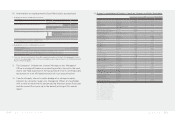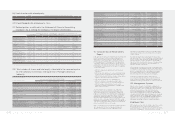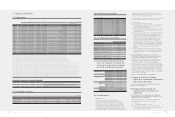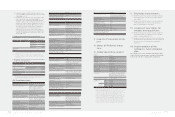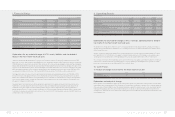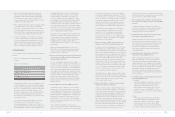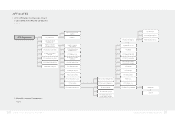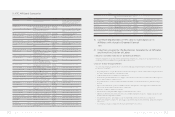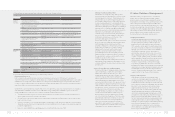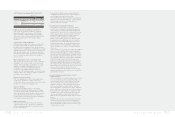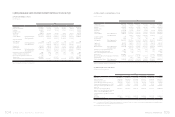HTC 2010 Annual Report Download - page 43
Download and view the complete annual report
Please find page 43 of the 2010 HTC annual report below. You can navigate through the pages in the report by either clicking on the pages listed below, or by using the keyword search tool below to find specific information within the annual report.
84 2 0 1 0 H T C A N N U A L R E P O R T 85
Financial Status, Operating Resul ts And Risk Management
5. We work hard to maximize the productivity of each
link in our business chain, enhance time management,
standardize workflows and fully implement ISO quality
control practices in order to improve competitiveness
through reduced process and communications costs and
comprehensive quality management.
6. HTC's leadership in the industry helps ensure that suppliers
accommodate and meet HTC priorities in expanding
market sales. This helps mitigate risks related to reliance
on overseas suppliers for many critical components. We
further benefit from close strategic relationships that help
ensure supplier support and favorable purchase terms.
7. As the fastest growing sector of Taiwan's economy, the
electronics industry requires a steady stream of human
resources. Downsizing in the manufacturing sector has
increased the diculty in hiring entry-level workers. HTC
plans to continue to hire foreign workers and work with
schools to help increase domestic hiring in the future.
(2)Risk Factors
The following describes identified risks and related mitigating
measures.
1. Interest, forex, and inflation rate risks and mitigating
measures
Impact on HTC profitability:
Item 2010 (NT$1,000 or %)
Net Interest Income 310,326
Net Forex Income 235,597
Net Interest Income as percentage of
net revenue
0.11%
Net Interest Income as percentage of
Earnings Before Tax
0.69%
Net Forex Income as percentage of
net revenue
0.08%
Net Forex Income as percentage of
Earnings Before Tax
0.52%
Note: Calculated on HTC consolidated financial numbers
Working capital required to support the expansion of HTC
business operations has over recent years been supplied
exclusively from internal finances. As the corporation has
taken out no long-term loans, fluctuations in interest rates
have had no eect on the Company's liabilities. HTC is
prudent in its financial policies. Asset allocation decisions
prioritize security and fluidity, with most funds kept in
time deposit accounts. During 2010, HTC interest income
totaled NT$310 million.
HTC revenues are denominated primarily in US dollars
(USD) and euros (EUR). Manufacturing costs are
denominated primarily in US dollars. Forex fluctuations
have the potential to impact HTC revenues, operating costs
and operating profits. Apart from careful management of
the quality and payment cycles of its foreign currency-
denominated accounts receivable, HTC uses forward
exchange contracts to minimize its forex risk. At the
close of 2010, financial derivatives held by HTC related
to exchange risk were valued at USD447 million, EUR531
million, GBP57.4 million, JPY1,515 billion and CAD250
thousand. Fair value of the derivatives changes as a result
of forex fluctuations. A fall of 1% in the quoted exchange
rate of any one of the abovementioned currencies against
the NT dollar would result in a derivatives holding benefit
to HTC of approximately NT$368.315 million.
During 2010, the euro fell against the NT dollar from 1:46
to 1:39. The US dollar fell from 1:32 against the NT dollar
to approximately 1:29. Net exchange income earned
during 2010 totaled NT$235.597 million. Under eective
management by the Company, negative eects of
exchange rate fluctuations on profits in recent years have
been minimal.
Inflation in Taiwan was approximately 0.96% in 2010.
Inflation rates in North American and European markets
were also relatively negligible. Overall, inflation had no
significant impact on HTC profits.
2. Risks associated with high-risk/high-leveraged investment;
lending, endorsements, guarantees for other parties and
financial derivative transactions
HTC does not engage in high-risk ventures or highly
leveraged investments. Loaning of funds takes place only
between HTC and its subsidiaries. HTC acts as guarantor
only to wholly owned subsidiaries. All such arrangements
must be reviewed and approved by the board of directors
in accordance with the Operational Procedures for Fund
Lending and Rules for Endorsements and Guarantees. HTC
engages in derivative products trading only to mitigate
forex risks arising from foreign currency assets and
liabilities. All derivative trading is conducted according to
stipulations written in the Procedures for Acquisition or
Disposal of Assets.
3. Future R&D plans and anticipated R&D expenditures
Recent R&D work at HTC has focused on user interface,
mobile-Internet related technologies, as well as related
technical support and after-sales service. The 2009 launch
of HTC's proprietary user interface HTC Sense marked a
breakthrough for the Company in terms of enhancing user
experience. HTC launched HTCSense.com in 2010. This
powerful suite of connected services lets users manage
their mobile experience quickly and easily via HTC phones
or personal computers.
HTC is currently reconfiguring its HTC Sense user
experience to operate with tablets. HTC announced its first
tablet, the HTC Flyer, in February 2011. HTC applied digital
ink technology to develop HTC Scribe, which integrates
touch interface and handwriting functionality. HTC Flyer
is also the first device to support HTC's online multimedia
service - HTC Watch. HTC Watch allows users to download
on-demand instant-play high definition (HD) content at
competitive prices. OnLive's online gaming services are
also bundled into HTC Flyer, making it the world's first
tablet featured with cloud-based mobile gaming services.
HTC has always stressed the importance of R&D and
technological innovation. R&D personnel account for
around 30% of HTC's worldwide headcount and we
invest some 4~6% of annual revenues in R&D related
activities. HTC will continue to focus on handheld devices
and will further enhance user experience to strengthen
competitiveness in the long term.
4. Effects of domestic / foreign government policies and
regulations on HTC finances and response measures
Government incentives of primary benefit to HTC include
permitted deduction of R&D related investments and a
previously permitted five-year tax break. After expiration of
the Statute for Industrial Upgrading in 2009, the Legislative
Yuan on 12 May 2010 announced passage of the Statute on
Promoting Innovative Industries that extended government
permission to deduct R&D related investments and
permitted continuance of the five-year tax break until full
term. Revisions to Article 5 of the Income Tax Act by the
Legislative Yuan in May of 2009 and again in May of 2010
reset the profit tax rate assessed on businesses from 25%
to 17%. These changes should have no significant impact
on HTC's income tax burden over the short term as HTC
enjoys alternative minimum tax treatment.
Apart from the above, changes in domestic and overseas
government policies and laws should have no significant
impact on HTC finances. We will remain vigilant with regard
to future changes and take measures that best satisfy
HTC's business operation needs.
5. Effects on HTC finances of changes in technology and
industry trends and response measures
Wireless telecommunications is an important growth sector
within the IT industry and the smartphone is its flagship
product. Responding to rapid mobile internet growth and
communication technology migration to 3G/4G, HTC has
leveraged outstanding R&D capabilities in partnerships
with global telecom leaders to launch numerous "world
firsts" that include the world's first Windows Mobile,
Android, dual mode GSM/WiMAX, and LTE Android mobile
phones. The launch of a diverse range of products through
many carriers worldwide has built up HTC's significant
position in the global telecommunications industry and
created exceptional business opportunities. HTC will
continue to use its resources to develop new technologies
and enhance the holistic user experience in order to deliver
products and services that fit market demand.
6. Effect of changes in the company's corporate image on
the company's crisis management protocol and mitigating
measures
HTC maintains high professional ethics and eective
control over its operations. Corporate honesty and ethics
rules eectively bar all in the HTC organization from
engaging in dishonest or unethical practices.
7. Anticipated benefits / potential risks related to mergers
and acquisitions and mitigating measures
Mergers and acquisitions in recent years have focused on
raising overall product value and enriching the HTC user
experience. All such activities have been funded internally.
Future mergers and acquisitions will be conducted
after careful consideration of expected benefits and
in accordance with all relevant government laws and
corporate regulations.
8. Anticipated benefits / potential risks of HTC plant
expansion plans and mitigating measures
Apart from regularly enhancing production capacity,
quality and optimizing costs, HTC is working to meet
rising smartphone demand by expanding capacity. HTC
expanded production at its Kangqiao plant in Shanghai
in 2009. HTC's board of directors also approved to build
a new oce and production building at the HTC Taoyuan
headquarters within a NT$2.8 billion budget to meet
future growth. Furthermore, designation of authorized
outsourcing partners has added another level of flexibility
to HTC's production.
9. Concentration risks associated with goods received and
sold and mitigating measures
(1) Purchases:
The skills and capabilities of materials / components
suppliers are maturing in step with mobile phone
technologies. Growing opportunities to source
materials from multiple suppliers reduce the risk of
overreliance on one or several suppliers. HTC also
purchases in volume to reduce unit costs and optimize
cost structures.
(2) Sales:
HTC products are distributed across the Americas,
Europe and Asia primarily through major carriers
and local retail channels. The influence of carriers
can be expected to rise in the new age of 3G/4G
wireless standards, which is expected to benefit HTC
product penetration. Apart from working with current


